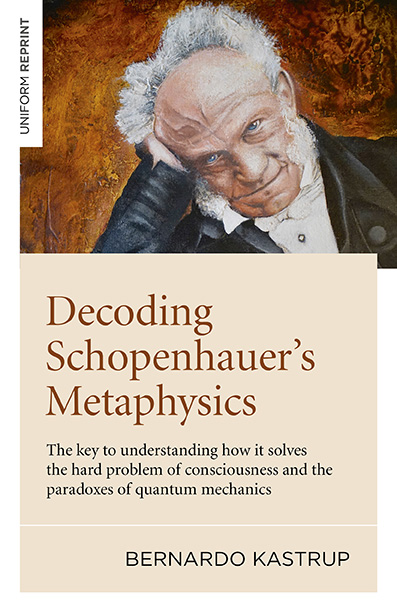Decoding Schopenhauer’s Metaphysics
A succinct but complete guide to Schopenhauer's metaphysics that renders it coherent and intuitively compelling.

A succinct but complete guide to Schopenhauer's metaphysics that renders it coherent and intuitively compelling.
A succinct but complete guide to Schopenhauer's metaphysics that renders it coherent and intuitively compelling.
Individual philosophers, Metaphysics, Quantum theory
First proposed more than 200 years ago, Schopenhauer's extraordinarily prescient metaphysics - if understood along the lines thoroughly elucidated and substantiated in this volume - offers powerful answers not only to the paradoxes of quantum mechanics, but also to modern philosophical dilemmas such as the hard problem of consciousness - which plagues mainstream physicalism, and the subject combination problem - which plagues constitutive panpsychism.
This invaluable treasure of the Western philosophical canon has eluded us so far because Schopenhauer’s argument has been consistently misunderstood and misrepresented, even at the hands of presumed experts.
Hoping to change this situation, Decoding Schopenhauer’s Metaphysics, offers a conceptual framework, a decoding key for unlocking the sense of Schopenhauer’s metaphysical contentions in a way that renders them mutually consistent. With this key in mind, even those who earlier dismissed Schopenhauer’s metaphysics should be able to return to it with fresh eyes and at last grasp its meaning. And for those as yet unacquainted with Schopenhauerian thought, this volume offers a succinct and accessible entry path.
Click on the circles below to see more reviews
............................In his introduction to Decoding Schopenhauer’s Metaphysics, Kastrup suggests that, had the coherence and cogency of Schopenhauer’s metaphysics been recognised earlier, much of the underlying philosophical malaise in our culture today — with its effects on our science, cultural ethos and way of life — could have been avoided. He hopes to change attitudes to Schopenhauer by offering his conceptual framework as a ‘decoding key’ for interpreting Schopenhauer’s arguments in a way that makes them mutually consistent and compelling and, one must say, Kastrup achieves this with lucidity and alacrity, and in just 120 straightforward and accessible pages.........He anticipates the claim that he might be projecting his own ‘system’ on to Schopenhauer, and points out that, in writing his latest book, he was aware of the ‘inherent potential for bias’ and made deliberate efforts to avoid it. He says he was surprised to find ‘clear similarities’ with his own metaphysics, but that: ‘Here was a famous 19th century figure who had already figured out and communicated … much of the metaphysics I’d been working on. What better ally could I have found?’ Intended meaning Kastrup’s own work was surely a preparation, then, for seeking out the intended meaning of Schopenhauer’s discourse — Kastrup ‘sank his teeth’ into The World as Will and Representation — despite his (Schopenhauer’s) often casual and seemingly contradictory use of words. One could even say it was Kastrup’s work that was needed to bring about elucidation of Schopenhauer’s. After all, Kastrup spent a decade grappling with the same problems and so ‘could thus not only understand but also recognise [his italics] Schopenhauer’s contentions’. In the 200 years since publication of The World as Will and Representation, our metaphysics has, sadly, continued to be in a state of disrepair, Kastrup maintains, with mainstream physicalism regarded as ‘the least implausible option’, despite its serious shortcomings. This when a viable alternative has been there all along, although unnoticed: ‘Had Schopenhauer’s metaphysics been properly appreciated earlier, our philosophical outlook today would perhaps be more mature.’ Those who might well have rejected Schopenhauer’s metaphysics in the past now have, thanks to Kastrup, the means of looking at it with unjaundiced eyes, and anyone turning to Schopenhauer for the first time has an indispensable and concise introduction to the subject. Not only that, for Kastrup has said elsewhere — at his ‘Metaphysical Speculations’ blog — that, for the sake of our own sanity in the West, we must seize this opportunity of recovering our spiritual identity. Schopenhauer’s is a formidable body of work entailing both formal metaphysics and profound introspective insight, ‘a treasure lying at the heart of the West, yet largely ignored by the West. As we busy ourselves trying to attain enlightenment through paths developed in the East, we miss one meant for ourselves, developed by a person much like ourselves. It is time we changed this and reclaimed what is ours’. Then Schopenhauer might no longer be regarded as philosophy’s most famous pessimist. ~ Geoff Ward/Medium .com